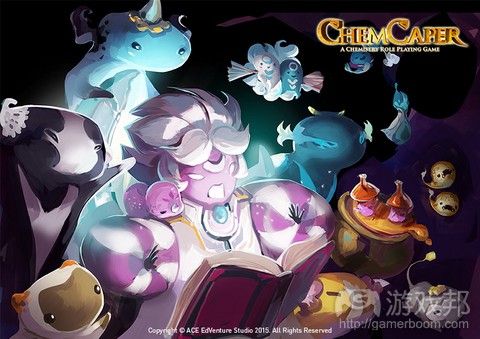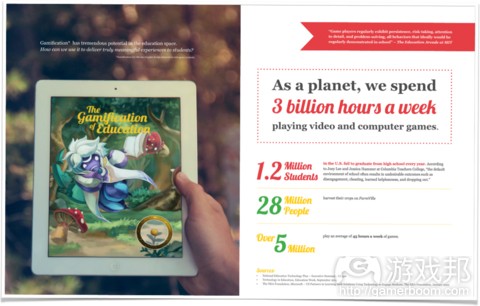关于创造教育类游戏《ChemCaper》
作者:Tim
《ChemCaper-Petticles in Peril》是ACE EdVenture Studio与Artoncode(位于印度尼西亚雅加达的一支开发团队)合作开发的一款即将发行的角色扮演游戏。据称这是世界上第一款基于剑桥大学的IGCSE化学教学大纲的教育类游戏,而像周期表中的元素,化合物,结合类型,以及直接从教科书上拿出来的实验仪器装置等主题都被转换成了《ChemCaper》中的故事或游戏元素。
玩家能够通过游戏玩法学到有关原子价,离子以及金属键等概念。在有效时间战斗系统中,我们将看到孩子们在忠实的Petticles(即由化学键所组成的生物)的帮助下与各种敌人进行对抗。完全地了解每个Petticle你便能够看到真实的粒子所呈现出的独特特征。
除此之外,学生们将学会如何在各种迷你游戏中区分混合物,如何提炼液体,如何筛选贵重金属,而这一切将向学生们呈现出只在实验室可能看到的各种化学仪器。
尽管创造一款带有这样的范围和量级的角色扮演游戏看似是一件巨大的工作(也许也可以使用“具有风险性”这样的描述),但ACE EdVenture Studio似乎拥有适当的人员和经验能够完成它。由首席执行官兼创始人Anne Tham(游戏邦注:她同样也创建了Sri Emas和Dwi Emas国际学校)所领导的核心开发团队包含了一些知道如何让学习变得更有趣的教育家和高校老师。
在本次访问中我们将询问ACE EdVenture的创始人Anne Tham有关她为学生们创造基于化学的角色扮演游戏的灵感来源,她在教育21世纪的学生所使用的哲理,以及她将《ChemCaper》的游戏世界带向物理学,生物学,甚至是数学等学习科目的未来计划。
你好Anne,首先感谢你抽出时间接受我们的访问。首先能否先简单地介绍下你自己和你的学校?
我是从28年前便开始从事教育事业,那时候我还是在一家地方高校辅导学生,并且那时的自己也从未想过教育事业会成为我的终身事业,甚至直至今天我仍在从事着这项工作。
我在1996年想要组建ACE Ed-Venture的决定其实很简单,那时候我意识到我们应该在学生们进入高等教育前逐渐向他们灌输他们在大学所需要的一些主要技能。学生们也喜欢我们的教育方式,所以我们便在2012年创建了自己的学校Sri Emas国际学校。而现在我们也致力于开办另一所学校,即Dwi Emas国际学校,这也会是马来西亚的第一家民办学校(位于莎阿南这座城市)。
关于《ChemCaper》,你和你的团队都致力于将化学变成一个有趣的学科。能否进一步跟我们描述下《ChemCaper》以及为什么你们选择了化学作为游戏主题?
因为学生们都非常热衷于实用数字媒体,所以我们便决定好好利用它们。一种方法便是使用具有教育性且家长能够接受的内容去取代传统的RPG内容。如此我们便构想出了《ChemCaper: Petticles in Peril》这款化学游戏。
之所以选择化学作为第一门学科是因为这是最难解释的科学学科,因为在这里所有的一切都是基于分子状态。对于学生来说化学总是很难理解,因为我们总是需要依赖于文字去解释发生了什么。而个人理解化学的能力是依赖于他们基于分子层面去想象或理解发生了什么。这与我们在物理或生物中所经历或感受到的东西是不同的。
与传统理念不同的是,孩子们并不讨厌学习,他们只是不喜欢面对无聊的内容。所以我们的任务便是改变传统的教育方式。在这个时代,让孩子们抛弃工具而去使用教科书恐怕是不可行的。所以我们便决定为孩子们花费了大量时间的设备(游戏邦注:如平板电脑和智能手机)设计一款游戏。
你们已经将《ChemCaper》变成学生们玩游戏与学习化学的一种完美工具了。但是对于成人,即那些已经来到工作世界的人来说,他们是否能从这款游戏中感受到乐趣呢?
尽管我们是基于帮助学生们更有效地学习化学这一目的去创造《ChemCaper》,但是我们也认为这并不是只有学生才能玩的游戏。因为我们一开始便将《ChemCaper》作为一款游戏去设计,所以我们认为成人也可以将《ChemCaper》当成游戏,只不过这款游戏还带有学习化学的福利而已。
开发一款像《ChemCaper》这样带有你们所计划的范围和功能的游戏需要多大的成本?
我们投入了大量资金去开发《ChemCaper》。我可以告诉你开发一款游戏并不便宜,任何产业资深人士都会同意这一观点。而《ChemCaper》则是一款由想要将化学变成一门容易理解与记忆的学科的老师们所创造的游戏。
想象整个中学课程将以5个部分出现在一款RPG游戏中。而单单第一部便花费了包含30个人在内的整个团队3年的时间进行开发。
你们开发团队中的核心成员是谁?
《ChemCaper》是一个全球性项目;我们的化学和叙述团队,2D和3D美术师以及管理团队全部是内部员工。而我们的艺术总监则是来自悉尼的马来西亚人Nicholas Chong。
关于音乐我们选择与GEM Impact合作,这是一家由Norihiko Hibino所创建的音频制作工作室。现在的GEM Impact以其为《合金装备》系列所创造的作品而出名。
为了提高游戏设计和编程质量,我们选择了与来自Artoncode的Indra Gunawan和Anton Budiono合作。与总部位于雅加达的Artoncode合作简直太棒了。他们为我们提供了非常有效的策略。这真的是一个非常奇妙的合作关系。
在今年的游戏开发者大会上你们向参与者们展示了《ChemCaper》,你能否向我们描述下这次经历呢?
我们在旧金山待了2周,在这期间我们参加了游戏开发者大会以及2015年美国游戏联盟。许多参与者来到了我们的展台并尝试了《ChemCaper》,他们都对教育内容与刺激的游戏玩法间的结合感到惊讶。我们甚至见到了一些产业中非常有名的人,甚至像Bloomberg,Reuters,Yahoo Finace,CBS 8以及Gamasutra等知名媒体都报道了《ChemCaper》的新闻。这次的曝光对于我们来说真的非常有帮助。
教育
在过去20年学习方法发生了什么改变?
这里的关键词在于学习和教学方法“必须发生改变”。然而事实上变化却并不大,因为我们总是过分强调成为最优秀的学生或者成为全优生的压力。
许多学习中等或中上的学生们从未觉得自己能够获得成功,因为他们认为自己并不属于优等生的行列。而对于那些中下的学生来说情况便更加糟糕。这是一种悲剧,但事实上这却是因为作为家长,老师以及社会成员的我们始终秉持着这样的理念。
的确有很多家长和老师都清楚这种情况必须发生改变,但问题就在于我们该如何做呢 ?
根据你的看法,你认为未来的学习方法应该是怎样的?马来西亚人是否做好了迎接这种改变的准备?
学生们需要对学习过程产生好感。否则任何正规教育都不可能与其它可能导致学生们分心的娱乐形式相抗衡。当下,许多学生们都很讨厌学习。家长们必须想办法鼓励他们,劝诱他们,推动他们,指责他们甚至有时候还需要通过威胁让他们更努力地学习。在许多家庭这都是一场持久的战役。
从整体上看,马来西亚的家长们都能理解传统的学习方法但却很难接受团组学习和团组讨论过程。我需要帮助这些家长们更好地理解学生们需要学习创造关系的过程并与那些相互学习的人保持良好的关系,这与我们的工作方式是一样的。学生们需要在学校中便开始学习种种生活技能。
所以关于你的问题,我只能说如今还有很多家长并未意识到也未能准备好接受他们孩子的未来以及孩子们走向这一未来的过程。
你和你的老师们在学校是如何教授学生的?
我们是基于我们想要学习的方式而非成人们所认为的学习方式去教授学生。我们的课程是基于老师与学生之间以及学生与学生之间的互动性而展开。
我们始终都在努力推翻传统的学习与教育所具有的界限。我们的方法是将创造性带到所有学科中。这能够缓解学生们对于学习的抵触感。
家长们对于你们的非传统学习方法有何反应?
那些孩子们已经尝试过我们的教育系统的家长都非常喜欢我们的方法。他们发现自己的孩子逐渐拥有自信并且自我表达的能力也日渐增长。我们的大多数学生家长都很认可我们为他们的孩子所做的一切。还有大概25%未完成我们所提供的学习的学生的家长则是带着中立的态度。而当他们的孩子进入大学并拥有自己的生活时他们的态度便会发生改变,因为他们会发现自己的孩子比同龄人拥有更出色的表现。那时候那些“持怀疑态度的家长们”便会变成我们的最佳拥护者了。
《ChemCaper》的发行与未来
什么时候学生们能够下载并玩《ChemCaper》的第一个场景?游戏将面向哪个平台或设备发行?
《ChemCaper》将在2015年的最后一个季度面向App Store和Google Play发行,所以那时候所有人都能够从这些平台上下载到游戏并尝试游戏。
《ChemCaper》肯定非常适合PS Vita。现在你们是否打算将游戏移植到PS和主机上?
现在我们还未计划将游戏移植到PS Vita。但如果需求够大的话,我们一定会考虑的。
对于《ChemCaper》你们的未来计划是什么?
我们已经准备好开发《ChemCaper》的第二部。第二部将基于8年的IGCSE化学教学大纲展开,而第三部则会基于10年,第四部是11年。我们计划在未来三年内发行第三部和第四部游戏。除了化学外,我们同时也会创造关于物理,生物,数学以及高等数学等游戏,即我们打算面向全球学生创造一个教育类游戏生态圈。
(本文为游戏邦/gamerboom.com编译,拒绝任何不保留版权的转发,如需转载请联系:游戏邦)
Interview: Teaching kids chemistry, Final Fantasy-style, with ChemCaper
Tim
ChemCaper – Petticles in Peril is an upcoming role playing game from ACE EdVenture Studio, produced in collaboration with Artoncode (a development team based in Jakarta, Indonesia). Said to be the world’s first educational game based on Cambridge University’s IGCSE Chemistry syllabus, topics such as elements in the periodic table, compounds, types of bonding, and even laboratory apparatuses are lifted directly from the textbooks and repurposed as story or game elements in ChemCaper.
Concepts of covalent, ionic and metallic bonding are encountered and learned through gameplay. The Active Time Battle System will see kids battling various foes with the help of their faithful Petticles, creatures formed by chemical bonding. Learning comes full circle with each Petticle demonstrating unique traits representing real life particles.
Additionally, students will learn how to separate compounds, refine fluids, and sieve through precious metals in various mini games which will introduce students to the kinds of Chemistry apparatus used in laboratories.
Though creating a role playing game with such scope and magnitude may seem like a huge undertaking (some might even use the word “risky”), ACE EdVenture Studio does seem to have the right personnel and experience to get it done. Led by CEO and founder Anne Tham (who also founded Sri Emas and Dwi Emas International School), the core of the development team also consists of educators and academic teachers who know a thing or two about making learning fun.
In this interview we ask the founder of ACE EdVenture, Anne Tham, about what inspired her to make a Chemistry based role-playing game for students, her philosophy on educating children in the 21st century, and what are her future plans on branching out the world of ChemCaper into other school subjects such as Physics, Biology, and even Maths.
Hi Anne, first of all thank you so much for taking time out of your busy schedule for this interview. Perhaps we can begin our chat with a little introduction about yourself and your school?
My career in teaching started about 28 years ago when I tutored students in a local college, but back then I would never have imagined that teaching was going to be my life’s work and I’d be doing it until today.
My decision to form ACE Ed-Venture back in 1996 was an easy one, when I realized that a number of critical skills required of students at the college level need to be instilled before they were entered into tertiary education. Students loved the way we teach, so we decided to start our own school (Sri Emas International School) in 2012. Currently we are working towards opening our next school, Dwi Emas International School, the first entrepreneurial school in Malaysia, located in the city of Shah Alam.
With ChemCaper, you and your team have set out to make Chemistry a fun subject to learn. Can you tell us more about ChemCaper, and also why you chose Chemistry as the theme for your game?
Since students are so engrossed in the use of digital media, we decided not to fight them but to make use of the media that students like. One way of doing that is to replace the content of an RPG with something that is educational and acceptable to parents. Hence our Chemistry game, ChemCaper: Petticles in Peril was conceived.
Chemistry was chosen to be the first subject to be developed as it is the most difficult of the science subjects to explain, simply because everything is happening at a molecular level. The idea of Chemistry is difficult for students to grasp because we have to rely on words to explain what is happening. Hence an individual’s ability to understand Chemistry really depends on their ability to imagine or perceive what is happening on that level. It is unlike Physics or Biology where we can experience or feel what is happening.
And contrary to popular belief, kids don’t have anything against learning – they just don’t like to be bored while they’re at it. So we have made it our mission to change the perception of how education can be delivered. In this day and age, getting kids to drop their gadgets in favor of a textbook is probably not going to happen. So we figured it might just be better to design a game for a device (i.e. tablets and smartphones) which they are already spending most of their time using.
You’ve designed ChemCaper in such a way that makes it the perfect tool for students to play it and learn about Chemistry. But what about adults, especially those who are already in the working world? Will they find any enjoyment from playing the game, and how so?
Although we created ChemCaper with the vision that it can help students who are studying Chemistry to learn more effectively (through a fun medium), we think that it is not just exclusively for students. Since we designed ChemCaper first and foremost as a game, we figured that adults and just about everyone can play ChemCaper as a game, with the added benefit of learning Chemistry while playing.
What’s the cost of developing a game like ChemCaper, with the sort of scope and features that you have planned for it?
We have invested much of our own funds into developing ChemCaper. I can tell you that it’s not cheap to develop a game, and anyone in the industry long enough can certainly vouch for that. ChemCaper is a game created by teachers, who want to make the subject of Chemistry easier for students to comprehend and remember.
Our team took the intangible concepts in Chemistry, and molded them into something concrete by humanizing many of its fundamentals and theories, thus enabling students to have a better grasp of the subject.
Imagine the entire Secondary curriculum being delivered in an RPG of five acts. Act 1 alone has taken an entire team consisting of about 30 people 3 years to develop.
Who are the core members of your development team?
ChemCaper is actually a global initiative; the chemistry and narrative team, 2D and 3D artists, and the management team are all in-house. The art direction is by Nicholas Chong, a Malaysian based in Sydney.
For the music we collaborated with GEM Impact, an audio production studio founded by the Norihiko Hibino. GEM Impact is actually renowned for their work on the Metal Gear Solid series.
To enhance the quality of the game design and programming, we invited Indra Gunawan and Anton Budiono of Artoncode to be our partners. Our partnership with Jakarta-based Artoncode, has been nothing short of great. They got us straight away, what we were trying to do and how we were going to do it. It has been a fantastic partnership since.
Your team was at the Game Developers Conference this year to showcase ChemCaper to visiting attendees and participants of the event. Can you describe how the experience was like?
We were in San Francisco for two weeks, and during that time we participated in both the Game Developers Conference and Game Connection America 2015. Many attendees and participants visited our booth to try out ChemCaper, and they were thrilled by how well the educational content was incorporated with exciting gameplay. We even had the opportunity to meet with some of the biggest names in the industry, and news of ChemCaper was picked up and featured on many notable outlets such as Bloomberg, Reuters, Yahoo Finance, CBS 8 and Gamasutra. The exposure has been nothing short of tremendous for us.
On Education
How has the learning methodology changed (or evolved) in the last twenty years?
The key words are ‘has to change’ with reference to the learning and teaching methodology. However, not much has changed, in that there is an over-emphasis on being top students or the pressure of achieving straight A’s.
Many average and above average students don’t see themselves ever succeeding or even amounting to anything because they don’t see themselves as fitting into the top category. It’s even worse for those who fall below the average levels. It is tragic, that it is us, the adults – parents, teachers, and society in general – who perpetuated this belief.
And then there are many parents and teachers who know that this has to change, but the question is: to what and how?
In your opinion, what would the future methodology of learning be like? And are Malaysians prepared for it now?
Students have to relate good feelings to the process of learning. Otherwise, formal education cannot compete with the many forms of entertainment that distract and engage the students. Currently, many students have an aversion to formal learning. Parents have to encourage, cajole, push, scold and sometimes even threaten their children to work and to try harder at school. It is a constant battle at home.
In general, Malaysian parents understand the traditional method of learning but have difficulty accepting the ‘noise’ that is generated in the process of doing group work and group discussions. I had to help parents understand that the students are learning the process of building relationships and rapport with the people they work with, very much like the way we do at work. Students are and should be in school to learn life skills.
So, to answer the question, many parents are not aware of or ready for what their children’s future is going to be like and the process necessary to get their children there.
How do you (and your teachers) teach the students in your school?
We teach students the way they want to learn, not the way we adults think they should learn. Lessons are interactive in nature between teachers and students and among the students themselves.
We push the boundaries of how teaching and learning is done. Our approach is innovative in all subjects. This removes the students’ resistance towards learning.
And how are the parents’ reactions (or comments) toward your non-traditional methods of learning?
Those parents whose children have been through our system of education are our greatest advocates. They have seen their children grow in confidence and their ability to express themselves. The majority of our students’ parents love what we do for their children. About 25% (of parents) whose child/children have not completed their studies with us have mixed feelings. The tune changes when their children move on to college and with their lives, as they see their children excel or do so much better compared to their peers. That’s really when these “skeptical parents” become our advocates.
ChemCaper’s Release, and the Future
When can students download and play the first act of ChemCaper? And for what platforms or devices will the game be available on?
ChemCaper will be released in the last quarter of 2015 on the App Store and Google Play, so everyone will be able to download from these platforms and play the game.
ChemCaper would be perfect to play on the PS Vita. Are there currently any plans to port the game for PC and consoles?
Right now there are no plans to place it on PS Vita. But if there is enough demand, we can definitely look into that (making it available on PS Vita).
What are your future plans for ChemCaper?
We are already in the process of developing the second act of ChemCaper. Act II of ChemCaper will be based on Year 8 of the IGCSE Chemistry syllabus, while Act III is based on Year 10 and Act IV, Year 11. ChemCaper Act III and IV are scheduled to be released within the next three years. Besides Chemistry, we also have games for Physics, Biology, Math and Additional Math in the pipeline within the next few years, as we are planning to have an ecosystem of educational games out there for students globally.(source:indiegames)










































 闽公网安备35020302001549号
闽公网安备35020302001549号